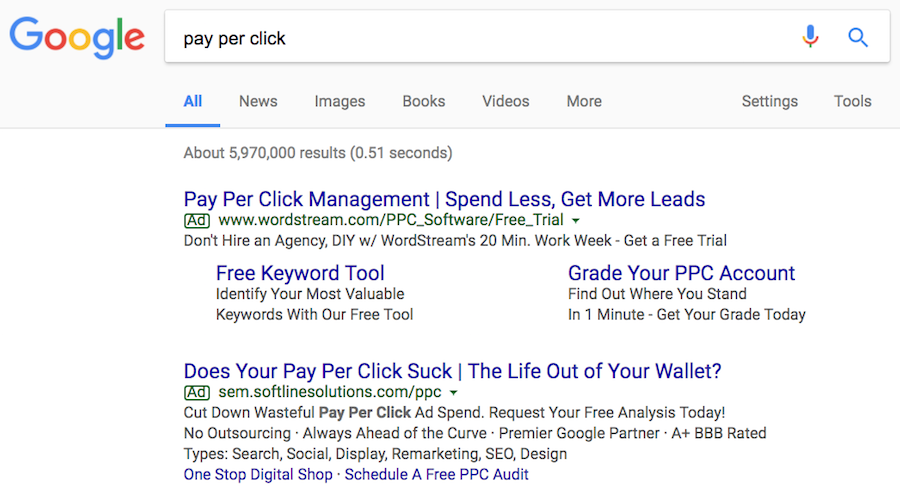Pay-Per-Click (PPC) advertising is a type of search marketing that places paid results at the top of the heap – see the first couple results marked “Ad” below.

Wordstream found that 41 percent of clicks go to the first three paid ads on a search results page and Upbounce says PPC visitors are 50 percent more likely to purchase something than organic visitors – so if you’re using PPC to draw people to your website, congratulations! You’ve chosen one of the fastest, more effective strategies.
But if you’re making these five mistakes, you’re not getting the return on investment you should be. Here’s what not to do on the road to proper PPC.
- Sending visitors to the wrong page. Let’s say you sell pet products and someone searches for a specific brand of dog bones. If you link them to your home page, they then must sort through your website to find what they need. This won’t result in more purchases – rather, it will send them back to the next result on Google.
- Requesting before offering. Are you sending visitors straight to your contact page? While that might seem like a good strategy, it’s more likely to lose visitors than generate leads. If you’re using Google AdWords (which we highly recommend), you’re not even allowed to require that visitors provide information in exchange for something free.
- Not testing your ad text. There are two ways to determine the effectiveness of your ads, but we recommend beginners use the simpler A/B split testing. This method pits two ads with only one different element – like words, colors, or page position – against each other, and tests that variable using Google’s Content Experiments program from your Google Analytics account. For step-by-step instructions, check this Entrepreneur article.
- Putting traffic before relevance. Relying on broad keywords can bring lots of people to your site, which is great…but not if they don’t really want to be there. If someone’s looking to adopt a dog and you lead them to your pet product site, they’ll be frustrated – even if they would’ve ended up there post-adoption anyway – so set your ads to “phrase” or “exact match.” Even if you get less visitors now, you’ll thank us in the long run.
- Neglecting negative keywords. We just discussed the importance of selecting relevant keywords that will lead people to your website. But a lot of people don’t realize that it’s just as vital to lead the wrong people away from your site. Example: adding the word “adoption” as a negative keyword would prevent that search from leading to your site. It takes time to research non-relevant keywords that might influence your campaign, but it’s time well spent.
Not sure you’ve righted these wrongs? Contact us for more information!

